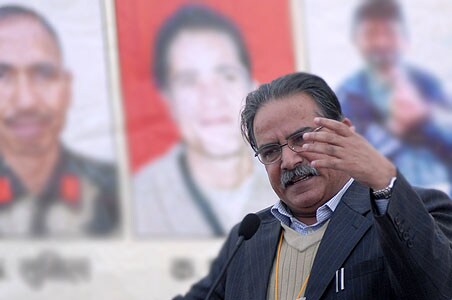
Terming UML as a "black sheep" among the Communists, Nepal's former premier and Maoist chief Prachanda has said he will launch the "people's movement-III" by forging an alliance with "nationalist forces" to establish civilian supremacy in the country.
"We will soon launch another people's movement," he said addressing his workers at Palung village of Makawanpur in west Kathmandu on Sunday.
Prachanda, who was eased out of power last month by CPN-UML-led alliance, announced the launch of people's movement-III, forging ties with "nationalist, patriotic and democratic forces".
He claimed that the movement would completely sweep away "reactionaries, opportunists and traitors" from the country to establish civilian supremacy.
Prachanda termed the present UML-led government as a puppet and said that the UML was the black sheep among the communist parties of Nepal.
He ruled out the possibility of another armed struggle but alleged that some forces were trying to push the Maoists back into the jungle.
"We will launch people's movement in the capital and districts to establish civilian supremacy," he added.
The Maoists had carried out a decade-long armed struggle since 1990 which in its second phase turned into a democratic movement by a multi-party alliance against the 250-year-old Monarchy.
Meanwhile, the Unified CPN-Maoist cadres captured 800,000 sq ft of land belonging to one Surendra Agrahari of Sunsari district in eastern Nepal on Sunday.
Thousands of Maoist supporters had halted traffic for two hours by staging sit-in in front of the Singhdurbar secretariat, the main government building complex, protesting against president Ram Baran Yadav's move to reinstate army chief General Rukmangud Katawal.
Dozens of people including policemen were injured during clashes between the agitators and security personnel in different places.
Last week, the new CPN-UML-led government of Prime Minister Madhav Kumar Nepal had scrapped the former Maoists dominated cabinet's controversial decision to remove the army chief, who was accused by Prachanda of disobeying the civilian government.

